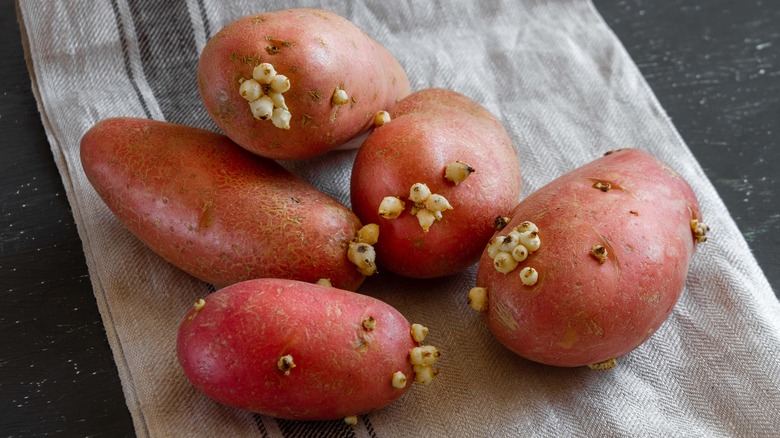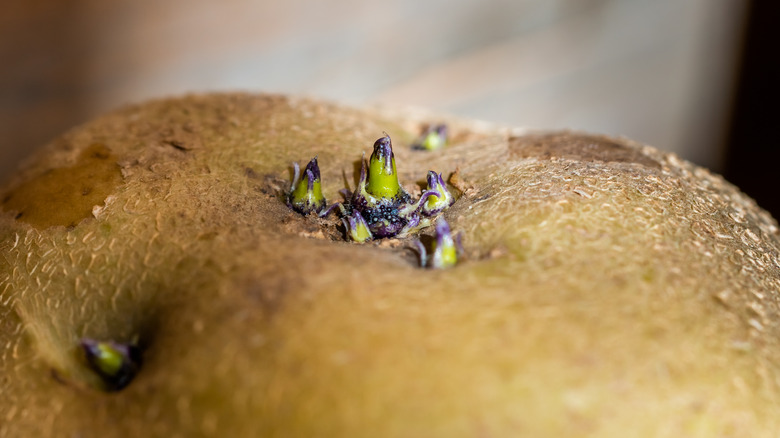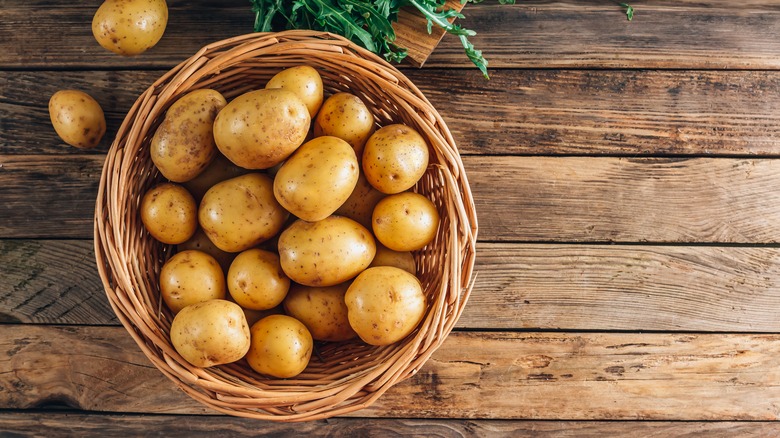Think Twice Before You Eat Sprouted Potatoes
It's time for dinner once again, and you've got a juicy steak on your mind. Knowing that there's no pairing quite as perfect for that steak as a steaming baked potato, you start rummaging through your spuds for a worthy candidate. But as you search, you notice little sprouts and green spots tainting your once-worthy side dish. So, what? Can you just pluck the sprouts and get on with it?
The bad news is that the sprouts on potatoes produce toxins that can be harmful in large doses. Potatoes are part of the nightshade family, and like other members within it, produce small amounts of unfriendly compounds like solanine. It's found primarily in the peel of the potato, the eyes, and the sprouts, and it can cause a range of symptoms, from headache to nausea and other digestive problems. Though you'd have to consume a large number of potatoes to reach it, a large enough dose of solanine can be fatal.
Even when your potatoes look pristine, they still contain some solanine, which is considered safe in small doses. The good news is removing the sprouts and green spots will eliminate most of the toxin, leaving you with a perfectly edible tuber.
How sprouts occur and what to do about it
When potatoes are exposed to light, they start producing chlorophyll, which is perfectly harmless and present in many foods we enjoy. Chlorophyll is what makes potatoes turn green. However, the same conditions that promote chlorophyll also encourage the production of solanine. Light, heat, and humidity all contribute to potatoes sprouting and increased solanine. The green color is simply a warning sign that solanine is also present, like a canary in a coal mine.
If your potato is overgrown with sprouts and it's soft, there may be no saving that spud. However, if only a couple of small sprouts are popping up, you should be fine peeling them off and cutting around any green that leached into the flesh. If the inner part of the potato has lots of green coloration, you shouldn't try to save it. There is no way to cook solanine out of the potato by baking it or any other means. Solanine has a distinctly bitter flavor, so it tastes off when cooked, it probably is, and you should throw it out.
How to prevent your spuds from sprouting
Preventing potatoes from sprouting and turning green only requires proper storage. Potatoes are best when kept in a cool, dry, dark place. Many people store potatoes in their pantry, which is a great place to keep them out of the light and prevent them from producing sprouts. Moisture and heat will also encourage sprouting — so a place that doesn't get too hot or humid (away from a sink or dishwasher) works best. somewhere where they receive light exposure, like a windowsill, will make them go green and start sprouting faster. One thing to consider is that potatoes should never be stored with onions or any vegetable that produces ethylene, as this will encourage them both to go bad faster.
Another trick to keeping potatoes at their best is to give them plenty of room to breathe. Placing them in a bag or sealed container will trap moisture and encourage sprouting and general spoilage. A ventilated basket is an ideal storage container for your spuds. Though potentially dangerous if left to sit in the sun too long, potatoes are packed with healthy fiber, antioxidants, vitamins, and nutrients.
It's worth making the effort to ensure they're stored correctly. Next time you're craving a delicious side for that savory steak, you can confidently reach into that dark corner of the pantry, knowing you'll pull out an untainted, sprout-free potato.


